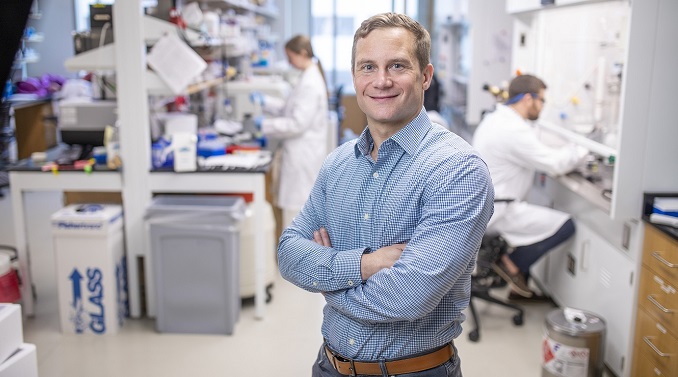News
-

$2.3 million NIH grant allows collaborators focus on advancing liver cancer surgical care
A multi-year collective effort between engineers, surgeons and scientists has resulted in a $2.3 million, four-year grant awarded by the National Institute of Biomedical Imaging and Bioengineering of the National Institutes of Health to improve laparoscopic liver surgery and liver cancer ablation therapy. Read MoreOct 10, 2019
-

Wilson awarded Komen breast cancer research grant
An engineering professor has received financial support from Susan G. Komen for breast cancer research. His project is among 60 grants totaling $26 million awarded to researchers nationwide. Those initiatives are focused on improving outcomes for metastatic breast cancer, reducing disparities in survivorship and developing new, more effective treatments. John T. Wilson, assistant professor of... Read MoreSep 25, 2019
-

Department of Energy webinar on federal funding set for Sept. 26
A special webinar on federal funding from the Department of Energy is scheduled for Thursday, Sept. 26, from 2 to 3 p.m. in the Baker Building, Room 800C. Remote viewing will be available with advanced registration. Register here to attend the webinar in person or remotely. “DOE and Biological Sciences” will cover a broad range of... Read MoreSep 17, 2019
-

ORAU award supports BME professor’s work on whole brain statistical modeling
Mika Rubinov, whose research involves building statistical models of whole brain data sets, has received a competitive research grant from Oak Ridge Associated Universities. Read MoreAug 26, 2019
-

REDCap data management tool reaches million user mark
Developed in 2004 by BME research professor Paul Harris Fifteen years after it was launched, REDCap, Vanderbilt University’s research data management tool, has reached 1 million users throughout the world. REDCap, or Research Electronic Data Capture, is a web-based platform originally devised by Paul Harris, professor of biomedical engineering, biomedical informatics and biostatistics. To date,... Read MoreAug 22, 2019
-

REDCap data management tool reaches million user mark
Developed in 2004 by BME research professor Paul Harris Fifteen years after it was launched, REDCap, Vanderbilt University’s research data management tool, has reached 1 million users throughout the world. REDCap, or Research Electronic Data Capture, is a web-based platform originally devised by Paul Harris, professor of biomedical engineering, biomedical informatics and biostatistics. To date,... Read MoreAug 22, 2019
-

Vanderbilt celebrates opening of Frist Center for Autism and Innovation
The ribbon-cutting of the Frist Center for Autism and Innovation with (l to r) Provost and Vice Chancellor for Academic Affair Susan R. Wente, Bruce and Bridgitt Evans Dean of Engineering Philippe Fauchet, Jennifer R. Frist, BS’93, William R. “Billy” Frist, Frist Center for Autism & Innovation Director Keivan Stassun, Daria Mulkey and John Mulkey.... Read MoreJul 29, 2019
-

Chang receives Early Career Award for advancing fMRI data analysis
Catie Chang has received the 2019 Early Career Achievement Award from a society of the Institute of Electrical and Electronics Engineers. Chang, an assistant professor of computer science, electrical engineering and computer engineering, was honored this week at the IEEE Engineering in Medicine & Biology Society conference. Specifically, the award cites her “innovative contributions to... Read MoreJul 25, 2019
-

Cellular soldiers designed to kill cancer cells that get loose during surgery, stop metastasis
Cellular soldiers created using the body’s own defenses can track down and kill escaping cancer cells during surgeries, preventing metastasis and saving lives, a Vanderbilt University biomedical engineer has discovered, particularly in cases of triple negative breast cancer. Michael King, J. Lawrence Wilson Professor of Engineering and chair of the biomedical engineering department, and his... Read MoreJul 24, 2019
-

Hand-held robot points to less invasive prostate surgery
Vanderbilt collaborators focused on minimally invasive prostate surgery are developing an endoscopic robotic system with two-handed dexterity at a much smaller scale than existing options. A key part of the design – telescoping, curved, concentric tubes – received U.S. patent protection in March 2019, the same month the principal investigators secured a $2.1 million R01... Read MoreJul 18, 2019
-

App prototype combines neural network, photos, burn patient info
Evaluating the severity of a burn injury – and whether it requires transfer to a Burn ICU or not – has been more art than science. About 79 percent of Total Burn Surface Area calculations are incorrect, sending more patients than necessary to specialized facilities, straining resources and compromising resuscitation and patient care. A senior... Read MoreJul 9, 2019
-

Five engineering faculty awarded Discovery Grants
Five proposals from School of Engineering faculty have been selected by the Office of the Provost for 2019 Discovery Grants, which advance new ideas and cutting-edge scholarship in the university’s core disciplines. “Discovery Grants serve as a key internal funding vehicle for fostering research that has the potential to improve lives and address society’s complex problems—a vital part... Read MoreJun 29, 2019
-

Weiss to lead VINSE starting July 1
Sharon Weiss (Vanderbilt University) Sharon Weiss, Cornelius Vanderbilt Professor of Engineering, professor of electrical engineering and physics and deputy director of the Vanderbilt Institute of Nanoscale Science and Engineering (VINSE), will become the new director of VINSE, Provost and Vice Chancellor for Academic Affairs Susan R. Wente announced today. Weiss’ appointment will begin on July... Read MoreJun 27, 2019
-

Vanderbilt engineers tripped people 190 times, but it was for a good cause
Andrés Martínez strode briskly on the treadmill, staring straight ahead and counting backwards by seven from 898, a trick to keep his brain from anticipating the literal stumbling block heading his way: a compact 35 pounds of steel specifically designed to make him fall. Special goggles kept him from looking down. Arrows on an eye-level... Read MoreJun 19, 2019
-

Nine engineering design projects earn awards for seniors
Nine exceptional student design projects have been recognized as winners in the School of Engineering’s annual design competition for the 2018-2019 academic year. More than 70 teams of senior engineering students in biomedical engineering, chemical engineering, civil engineering, electrical engineering, mechanical engineering and computer science presented their final projects on April 22—Design Day 2019. The... Read MoreJun 18, 2019
-

VU engages Lewis-Burke to connect faculty with federal sponsors
Vanderbilt University has engaged Lewis-Burke Associates LLC, a specialty consulting firm based in Washington, D.C., to afford faculty more opportunities for enhancing their research and scholarship. Through this engagement, Lewis-Burke will collaborate directly with faculty, provide advice on funding trends, identify new opportunities, discuss strategies to overcome funding challenges, and connect faculty with federal decision-makers... Read MoreJun 14, 2019
-

BME team develops quick DNA test for malaria drug resistance
One of the keys to quickly diagnosing anti-malarial drug resistance — potentially saving lives — lies in testing whole blood instead of extracting DNA, eliminating processing steps that can take hours or days. A team of Vanderbilt University biomedical engineers cracked the code to doing just that and are working on applying the method to... Read MoreJun 13, 2019
-

Data Science Institute welcomes first cohort of undergraduate summer research fellows
The Data Science Institute Summer Research Program aims to engage students who are interested in data science-related research with Vanderbilt faculty. (Vanderbilt University) The Vanderbilt Data Science Institute welcomed its first cohort of undergraduate summer research fellows in early June. The Data Science Institute Summer Research Program aims to engage students who are interested in... Read MoreJun 13, 2019
-

iPhone plus nanoscale porous silicon equals cheap, simple home diagnostics
The simplest home medical tests might look like a deck of various silicon chips coated in special film, one that could detect drugs in the blood, another for proteins in the urine indicating infection, another for bacteria in water and the like. Add the bodily fluid you want to test, take a picture with your... Read MoreJun 12, 2019
-

Cummings to present plenary lecture at global thermodynamics conference
Peter T. Cummings will present the Molecular Physics Lecture, one of five plenary lectures, at the global Thermodynamics 2019 conference on the coast of Huelva at Punta Umbría, Spain, June 26-28. The lecture—“The Molecular Simulation Design Framework (MoSDeF): Capabilities and Applications”—is sponsored by Taylor & Francis, publishers of the journal Molecular Physics. A division of... Read MoreJun 5, 2019